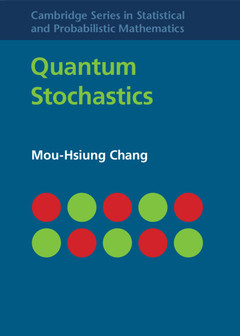Description
Quantum Stochastics
Cambridge Series in Statistical and Probabilistic Mathematics Series
Author: Chang Mou-Hsiung
This book provides a systematic, self-contained treatment of the theory of quantum probability and quantum Markov processes.
Language: English
Subject for Quantum Stochastics:
Approximative price 68.67 €
In Print (Delivery period: 14 days).
Add to cart
Publication date: 02-2015
424 p. · 18.5x26.5 cm · Hardback
424 p. · 18.5x26.5 cm · Hardback
Description
/li>Contents
/li>Biography
/li>
The classical probability theory initiated by Kolmogorov and its quantum counterpart, pioneered by von Neumann, were created at about the same time in the 1930s, but development of the quantum theory has trailed far behind. Although highly appealing, the quantum theory has a steep learning curve, requiring tools from both probability and analysis and a facility for combining the two viewpoints. This book is a systematic, self-contained account of the core of quantum probability and quantum stochastic processes for graduate students and researchers. The only assumed background is knowledge of the basic theory of Hilbert spaces, bounded linear operators, and classical Markov processes. From there, the book introduces additional tools from analysis, and then builds the quantum probability framework needed to support applications to quantum control and quantum information and communication. These include quantum noise, quantum stochastic calculus, stochastic quantum differential equations, quantum Markov semigroups and processes, and large-time asymptotic behavior of quantum Markov semigroups.
Introduction and summary; 1. Operator algebras and topologies; 2. Quantum probability; 3. Quantum stochastic calculus; 4. Quantum stochastic differential equations; 5. Quantum Markov semigroups; 6. Minimal QDS; 7. Quantum Markov processes; 8. Strong quantum Markov processes; 9. Invariant normal states; 10. Recurrence and transience; 11. Ergodic theory.
Dr Mou-Hsiung Chang served as a Professor of Mathematical Sciences at the University of Alabama in Huntsville for twenty-eight years, where he also served as department chair for eight years, prior to joining the US Army Research Office (ARO) in 2002. He has published extensively on stochastic analysis and control and on quantum stochastics, with more than 70 refereed journal articles, 40 conference papers and technical reports, and more than 80 invited technical presentations at conferences and universities.
© 2024 LAVOISIER S.A.S.




